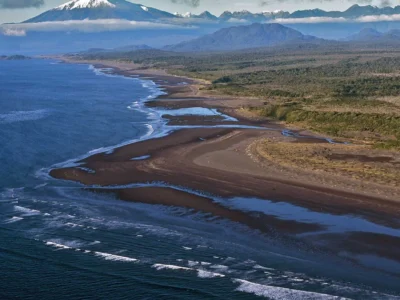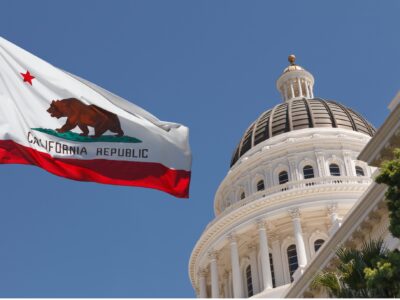(Energy) Independence Day
A post in which I surprise readers -- and myself -- with strong praise for George W. Bush.
Four years ago, President Trump announced that “with the tremendous progress we have made over the past three years, America is now energy independent.” And he was right that the U.S. had reached the point that it produced more energy than it used. But the kind of energy independence he trumpeted (or should I have said TRUMPeted?) is a chimera. Admittedly, Trump was not the first to prioritize this kind “energy independence.” (Nor has he been the last to a...
CONTINUE READINGCalifornia can help meet its climate goals by removing SERP’s sunset date
By Molly Bruce, Dave Smith, Michael Kiparsky, Derek Hitchcock, Peter Van De Burgt, Sydney Chamberlin, Megan Cleveland
Many regulatory clearances like permits aim to guard against projects that pose harm to the environment. However, permitting can also undercut environmental restoration efforts. While restoration is designed to remedy environmental harms and improve resilience to climate change, permitting can substantially increase project costs and slow or altogether impede environmentally beneficial projects. Striking an effective balance between an appropriate level of regulatory ove...
CONTINUE READINGA New Era of Conservation on the Horizon
Lessons from philanthropist and conservationist Kris Tompkins after a visit to the UCLA Emmett Institute.
"Sentiment without action is the ruin of the soul." That line by writer Edward Abbey is a favorite quote of Kris Tompkins. She’s the legendary conservationist and philanthropist who recently visited UCLA Law at the invitation of the Emmett Institute and the Lowell Milken Center for Philanthropy and Nonprofits. Ever since Thompkins’s visit with our staff and students, I have been thinking about the uncertain future of conservation in the context of climate chang...
CONTINUE READINGJudicial Review After Loper Bright
We used to have the Chevron test? What test do we have now?
The Supreme Court's overruling of Chevron set off a fiery debate. That's an important debate to have. The Court isn't going to change its mind any time soon. Lawyers need to deal with the new reality, which means they need to understand the new test that replaced Chevron. As I see it, there are two steps to statutory interpretation under Loper Bright, with an additional preliminary step: Step 0. Is this an exceptional situation?. If a regulation was ...
CONTINUE READINGIs the Sky Falling? Chevron, Loper Bright, and Judicial Deference
Perplexed? Worried? Here’s a guide to a fraught area of law.
If you’re confused about the Supreme Court’s ruling, you’re not alone. Scholars will be discussing the recent ruling for years. It clearly will limit the leeway that agencies have to interpret statutes, meaning less flexibility to deal with new problems. But unlike many commentators, I don't think the sky is falling. I was teaching environmental law before Chevron was decided, and I can testify that agencies like EPA were able to succeed in that setting. I'll try ...
CONTINUE READINGThe Third Political Branch
Time for Term Limits?
In 2021, Supreme Court Justice Amy Coney Barrett famously said, “my goal today is to convince you that [the Supreme] Court is not comprised of a bunch of partisan hacks.” Justice Barrett is correct. The Justices are not hacks, but rather polished political actors. Let’s review: In West Virginia v. EPA, 142 S. Ct. 2587 (2022), the Court created the Major Questions Doctrine, precluding federal agencies from resolving questions of “vast economic and...
CONTINUE READINGLosing Chevron: What Does It Mean for California?
The Supreme Court’s decision in Loper Bright will not necessarily impact how California courts review our state agency determinations. But we’ll feel it in other ways.
A question I’ve been getting a lot since the Supreme Court overturned the Chevron doctrine is: “What does this decision mean for California?” Here are three takeaways about how the Golden State is likely—or not—to be impacted at first blush. First, the decision does have the potential to impact California directly in some pending litigation. For example, there’s a current challenge to EPA’s waiver under the Clean Air Act for the Air Resources Board’s A...
CONTINUE READINGIs Loper v. Raimondo Really the Power Grab Commentators Assume?
The Supreme Court has already grabbed power from agencies through the major questions doctrine.
Headlines about today's decision in Loper v Raimondo overturning the 40 year-old decision in Chevron v NRDC that granted agencies deference in their interpretation of ambiguous statutes focus on the "massive power grab," the decision's "sweeping" nature and call it a "blow" to the administrative state. My view may be idiosyncratic but I don't view the decision as the power grab being portrayed. That power grab has already occurred. The Supreme Court has used a diff...
CONTINUE READINGThe Biden-Trump Debate’s Climate Question
“You’ve vowed to end your opponent’s climate initiatives," Trump was asked. "But will you take any action as President to slow the climate crisis?”
The first—and possibly last—debate between President Joe Biden and Donald Trump was never going to be about the existential climate crisis. But the CNN moderators did press the issue in one question. The meandering answer that followed was a microcosm of the whole excruciating affair. I wrote here about 22 possible climate-related questions that CNN’s Dana Bash and Jake Tapper could ask, as well as one question that they should avoid. Thankfully, when Bash...
CONTINUE READINGGrid Experts Weigh in on EPA’s Good Neighbor Plan for NOx
UCLA Emmett Institute faculty submit amicus brief in Utah v. EPA, a major ozone case, on behalf of some of the nation's leading grid experts.
Last year, EPA issued a new federal implementation plan to address interstate pollution from nitrogen oxides under the Clean Air Act’s Good Neighbor Provision. The Good Neighbor Provision is designed to address interstate pollution: those instances where emissions from upwind states impose harms across state lines, effectively shifting the costs of controlling their pollution to downwind states. EPA’s 2023 “Good Neighbor Plan” for nitrogen oxides is currently...
CONTINUE READING











